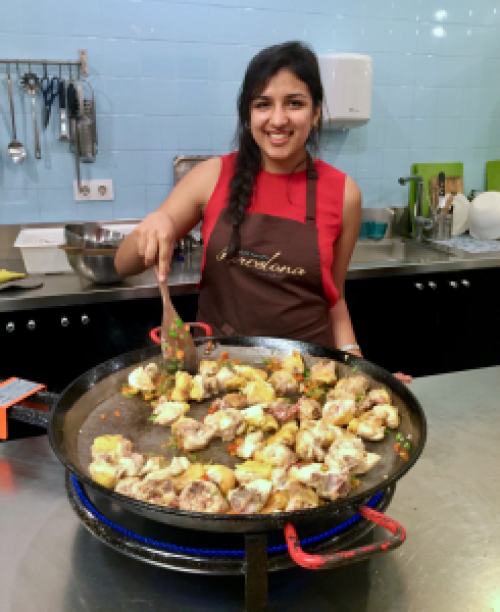December is here! This month, Ambassadors will be writing about their experiences studying away from campus in Spain and the United Kingdom. Senior Hadassa starts off by giving us a taste of her year abroad in Barcelona.
By Hadassa Jakher '18, Government and Spanish double major, International Relations and Law & Society double minor
My decision to study abroad was monumental, and pretty daunting. Was I really going to pack up my things and leave behind everything and everyone for an entire year? At first, I hadn’t really planned on it. In fact, I hadn’t planned to major in Spanish, much less spend more time abroad. I had already fallen in love with Spain the summer after my freshman year through the Cornell in Madrid program, but I still felt a lingering taste for adventure. After going back and forth countless times, I finally decided to ignore my apprehensions and just take the plunge. I am so glad I did, because it was one of the highlights of my university experience.
From the many programs in various cities across Spain, I had settled on the Consortium of Advanced Studies Abroad (CASA) in Barcelona, which brought together students from different universities across the U.S. The structure of CASA added greatly to the quality of my experiences abroad. I was excited to live in a student flat in the innovative 22@ district (rather than in a home-stay) because of its proximity to the city center, beach, and the university. The program had three wonderful advisors that helped with every aspect of studying abroad, from transportation to choosing classes to adjusting to the slower Catalan pace of life.
One of the great things about CASA was that it provided plentiful opportunities for me to immerse myself into the culture of Catalonia and Spain. Before classes at the university began, the program held a short seminar course that taught us some basic Catalan and helped brush up on our Spanish, as well as giving us some context on the history and political atmosphere of Catalonia. We even participated in a cooking class to try our hand at making typical Spanish and Catalan dishes such as paella, gazpacho, pa amb tomàquet, and crema catalana.
In addition, each semester was centered around a particular theme that deepened our familiarity with the Iberian Peninsula, packed with weekend excursions. During the fall, we focused on modernism, Pablo Picasso, and his influences. Our first trip was just outside Barcelona where we visited the abbey Santa Maria de Montserrat which boasts a wonderful collection of modern and avant-garde paintings as well as stunning mountainous views. We took a weekend trip to the Costa Brava to see Salvador Dalí’s home, Portlligat, in Cadaqués and the Dalí Theater-Museum in Girona. We also spent a weekend in Madrid, the capital of Spain. We took tours of the impressive Prado and Reina Sofia museums, the latter of which boasts Picasso’s Guernica. In the spring, we looked at the ancient ruins and the impacts of the Roman rule in the Peninsula. We visited Tarragona in the Costa Duarada region of Catalonia, the oldest Roman settlement in the Peninsula, and saw the ancient ruins of a great amphitheater near the sea. We also took weekend trips to Valencia and Lisbon, and saw the architectural influences of the Roman Empire still present in the cities today.
I was even more deeply immersed into the Mediterranean culture through all of the activities in Barcelona. There was such a plentitude of museums (e.g., the Picasso Museum, the Museum of Design and the National Museum of Art), historical landmarks (e.g., the Sagrada Família, the Isle of Discord, the Montjuïc Castle), and entertainment (e.g., flamenco shows, beach discotheques, soccer games in Camp Nou) that I was constantly and actively engaging in la vida española. In addition, through CASA, I was able to select my courses from four different universities in the Barcelona. Besides my Spanish political science courses, I chose to take classes that would improve my Catalan so that I could speak both local languages. This opened up the number of courses I could take (since many were in Catalan) and helped me understand on a more personal level what I had learned about the political history of Catalonia. Despite my initial hesitations to study abroad for a whole year, spending time in Barcelona wonderfully complemented my studies at Cornell. I had a first-hand experience learning about an entirely different culture, social-political structure, and lifestyle. Not only did I grow to appreciate and integrate myself into another culture, but I was also able to look at my own country – the United States – through a fresh, new perspective. When I came back to Ithaca to start my senior year, I had definitely changed. Not only had my Spanish vastly improved, but I also had a different way of approaching my courses. My immersive year in Catalonia showed me that I could apply what I had learned, both at Cornell and abroad, to prosper in an unfamiliar environment and to get out of my comfort zone. Now, other monumental decisions that I have to make no longer seem as daunting.




